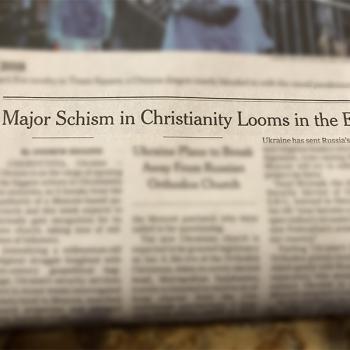Three Things to Keep in Mind
First: not all growth is good growth. When effectiveness is measured only by numerical growth, we make the fatal mistake of assuming that just because something grows rapidly, it is doing so under the blessing of God. All gardeners and physicians know this: rapid growth doesn’t necessarily mean good, healthy or desired growth.
Second: the process of making disciples is a long, slow, and often painful one. A disciple is one who is actually willing to walk the path of the Teacher, in this case, Jesus. That path leads to the cross, a place of utter aloneness and excruciating pain.
It is at the cross that the question must be asked and answered: Will I be a person of forgiveness and reconciliation, no matter what the cost, so I can go all the way to the resurrection?
Most will say no. It’s not fun anymore at that point. It’s no longer bells and whistles and loud music and video screens and constant movement and distraction.
Discipleship takes place in those moments when we are called to be still, to know that God is God, and to be able to say with the great man of old, that poor, beat up Job, “Even though He slay me, yet I will praise Him.”
Third, unless we address the deep and expensive structure of The United Methodist Church, we are doomed to follow the consumerist model. But the cost to maintain our current structure leads us to think we have no choice. And a place of no choice opens the door to the sin-compromised state where the ends are worth the means.
If we are going to go forth and do what we are called to do, then it is time to completely re-examine what holds us together.
When I entered into this church, I was drawn to two primary areas: the expansive, inclusive, wide grace-infused theology and the power of being a connectional church. Our theology turns us toward God and showers us with grace. Our connection turns us toward one another in covenant relationship. In covenant, we may pass that grace around, support one another as necessary and together live out the daily challenges of being disciples of Jesus.
A consumer-driven model is rarely grace-filled and is fundamentally competitive, not covenant or connectional, in nature. Others must fall for us to stand.
Consumerism means that those who know little of grace, little of deep sacrifice, little of the challenges of picking up our crosses daily, call the shots.
I look at the money that was spent to pull off the show we call “General Conference” this past year and weep. Every need had to be catered to. It appeared on occasion that the least gracious hijacked the floor and engineered the direction of the Conference. The displeased consumers, i.e., delegates, kept threatening in one way or another to take their business elsewhere.
The administrative arm of the church, which should be there to enhance the work of the local discipling community, instead pulls giant amounts of money out of the offering plates each week and month. It loads upon local clergy and congregations, that place where the work of discipleship takes place, impossible-to-decipher forms and strangling requirements for minutely detailed reports that are never looked at except to determine how much money to squeeze from them the next year.
The world laughs and says, “You have nothing useful to say.”
But we do. Yes, we do. We have the Gospel.
And yes, we must address the crisis. But it is much deeper than numbers and noses.
Let us answer the primary question first: “What IS a disciple of Jesus Christ?”
Then we can ask: “How can our forms of worship, gathering, instruction, connection and structure actually aid in the process of shaping those disciples?”
















